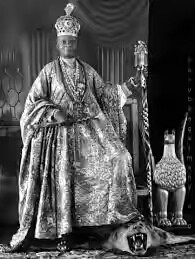| How Funmilayo Ransome-Kuti Sacked The Alake Of Egbaland In 1949 by Suurulere(m): 4:44pm On Aug 31, 2016 |
On January 3, 1949, Oba Samuel Ladapo Ademola (1872-1962) the 7th Alake of Egbaland (1920-1962), abdicated the throne due to a strife with Egba women, led by Funmilayo Ransome-Kuti (1900-1978) and her sister-in-law, Eniola Soyinka, mother of Nobel Laureate, Wole Soyinka (b. 1934) , on the issue of tax. The women were made to pay heavy taxes and were also maltreated.
After days, months and years of protest, the Alake, who was regarded as a stooge of the colonial master, was removed and forced out of office and had to move to Ogbomoso (other records say Oshogbo) where he stayed till December 1950 before things came back to normal.
The Lioness of Lisabi
Funmilayo Ransome-Kuti, was born Francis Abigail Olufunmilayo Thomas to Daniel Olumeyuwa Thomas and Lucretia Phyllis Omoyeni Adeosolu, on October 25, 1900. She was a teacher, political campaigner, women’s rights activist and traditional aristocrat.
She served with distinction as one of the most prominent leaders of her generation. She was also the first woman in Nigeria to drive a car.
Ransome-Kuti’s political activism led to her being described as the doyen of female rights in Nigeria, as well as to her being regarded as “The Mother of Africa.” Early on, she was a very powerful force advocating for the Nigerian woman’s right to vote. She was described in 1947, by the West African Pilot as the “Lioness of Lisabi” for her leadership of the women of the Egba clan that she belonged to, on a campaign against their arbitrary taxation. That struggle led to the abdication of the Egba high king Oba Ademola II in 1949.
She was raised by parents who valued education and became the first girl-student admitted to Abeokuta Grammar School, hence, her nickname-Beere (which means first girl in Yoruba). She later went to England for further studies. She soon returned to Nigeria and became a teacher. On January 20, 1925, she married the Reverend Israel Oludotun Ransome-Kuti (1891-1955). He also defended the commoners of his country, and was one of the founders of both the Nigeria Union of Teachers and of the Nigerian Union of Students. The marriage was blessed with four children; Olikoye, Beko, Fela and a girl, Dolapo.
In 1918, Governor-General Lugard had introduced a system of direct taxation and created the Sole Native Authority which was a form of indirect rule whereby the traditional rulers acted as agents for the colonial government. The Sole Native Authority (equivalent to today’s Local Government) was headed by the Alake. It had far-reaching powers and all the previous checks and balances on the power of the Alake was eroded under the indirect rule system as kingmakers, chiefs and priests who could act to limit the abuse of power of the Alake were now dependent on the Sole Native Authority for their appointment to advisory councils. In plain words, they were rendered effeminate.
Before the advent of the British, women had participated in politics and had their own representatives. The most important, was the Iyalode on state councils whose duty was to protect and promote women’s interest. When they (the British) came, it never occurred to them that women had any significant role and so they never made any provision for it. Nevertheless, some women titles like Iyalode and Erelu remained but they lacked power and influence.
The aching issue for the Egba women was taxation. Having been subjected to tax by the colonial government, they provided as much as one-half of district revenues. Yet, they had no direct representation on the Sole Native Authority council, a situation they abhorred so much.
Further, the manner by which taxes were collected was often through insult, violence, chasing of women, beatings and stripping of young women ostensibly to assess their age.
As time went on, complaints increased, reaching a point where women decided that their only chance to gain redress of their grievances was a more militant approach. They considered the tax as foreign, unfair and excessive. They also objected to the method of collection.
This was the one issue which catapulted Funmilayo Ransome-Kuti into the political limelight, first in Abeokuta and then in Nigeria.
In 1923, she (Funmilayo Ransome-Kuti) had organized a group of young girls and women into the Abeokuta Ladies Club. The group was made up of western educated middle class and mostly Christian women who concentrated on crafts and social etiquette.
Around 1943/44, the Abeokuta Ladies Club regrouped and expanded to include market women who had approached Kuti to explain their ordeal to her. Most of these women were uneducated and it was at this point that Kuti began her political activism which aimed at raising the standard of womanhood in Abeokuta, encouraging learning among the adults and thereby wiping out illiteracy.
Funmilayo Ransome-Kuti was appalled to hear of the level of exploitation by the colonial and Egba Native Authority, harassment by police and representatives of the Alake against women. She discovered that the Alake, the traditional ruler of Abeokuta was diverting confiscated rice to his own stores, selling it and pocketing the profits (the rice had been confiscated by the government from women traders).
In 1946, the burden of taxation became unbearable and the Abeokuta Ladies Club metamorphosed to Abeokuta Women’s Union. This was designed to challenge both colonial rule and the male-controlled structure. Through the union, they opposed price controls and imposition of direct taxation, engaged in press campaigns and mobilized so much pressure against the Alake.
The Abeokuta Women’s Union was a well-organised and disciplined organisation. Mass refusal to pay the tax combined with enormous protest led to brutal response from the authorities as tear gas were deployed and beatings were administered. Funmilayo Ransome-Kuti ran training sessions on how to deal with this threat, teaching women how to protect themselves from the effects of tear gas and how long they had to throw the canisters back to the authorities.
In late 1946, the Alake increased the tax rate for women. Thousands of women marched to the palace to protest these increases. The Alake’s only response was that if any woman felt her taxes are too high, she should appeal to him individually.
It seemed there was nothing to achieve, so the Abeokuta Women’s Union, through their leader, Funmilayo Ransome-Kuti, engaging in tremendous letter writing effort, outlined the women’s grievances to newspapers in Lagos and Abeokuta.
A mass movement was organised and they laid down objectives, some of which included:
Resistance against the poll tax
Resistance against harsh enforcement of sanitation regulations, the payment of water rate, and
The removal of the Alake from office.
The Alake was vigorously criticised, since he was considered the personification and symbol of the Sole Native Authority to the detriment of his people’s well-being. Although, the colonial government was the real source of power, the Abeokuta Women’s Union attacked its agents, the Sole Native Authority and the Alake. They challenged the Alake’s abuses of food and price controls, his interference in trade and court matters. He was also charged for demanding sex from some women who had left their abusive spouses to take refuge in his palace and charging them for accommodation.
In addition, the Abeokuta Women’s Union called for representation of women on all bodies that administered Egba affairs by members of the union. Their rationale was that since the men had not protected their rights, women’s representatives were needed to do so. The anti-tax protest was a long one with Funmilayo Ransome-Kuti at the head leading the women in the struggle.
In 1947, Funmilayo Ransome-Kuti refused to pay her taxes and was arrested. At her arraignment where she pleaded “not guilty”, thousands of women congregated at the courthouse to demonstrate their support. The next year, she again refused to pay her taxes. She led the Abeokuta Women’s Union in laying down plans for a systematic programme of mass protest.
The first major demonstration held on November 29 and 30, 1947. Many women took part. As they neared the Alake’s palace, she commanded the marchers to stop, closed her eyes and told them that all those who were afraid should leave while her eyes were closed. None withdrew. They maintained vigil during which they sang abusive songs.
In reference to the Aba women’s riots of 1929, the women were careful to stress the importance of not allowing the authorities any excuse to attack them or use violence by making sure no weapon was carried. Many women were jailed but were later released.
In January, 1948, Kuti was banned from the palace for insulting the Alake and the British administration supported it. Administrative attempts to woo away the Abeokuta Women’s Union executive from its support of Kuti failed. They also refused to attend any meeting without Kuti.
By April, the women were determined to get rid of the Alake and obtain their demands, one of which included that the Alake be removed from office. They continued their demonstration and vowed to go on the streets in nudity (a taboo in Egbaland).
To gain time, the Alake decided to go for a holiday at the beginning of June in Jos, hoping things would cool off in his absence. He appointed a special committee to investigate the complaints of the women. He also suspended their taxation and agreed to women representative on the central committee. Alas, the women were no longer interested in anything he did. http://www.historyvilleng.com/2016/08/22/how-funmilayo-ransome-kuti-sacked-the-alake-of-egbaland-in-1949/ 5 Likes 8 Shares 

|
| Re: How Funmilayo Ransome-Kuti Sacked The Alake Of Egbaland In 1949 by ichoku: 5:11pm On Aug 31, 2016 |
Despite all the noise. They can only copy. We know the right holders to women uprising against taxation in the whole of Africa. They were imitated clear twenty years after.
IGBO ndi oma ekene oooo 8 Likes 2 Shares |
| Re: How Funmilayo Ransome-Kuti Sacked The Alake Of Egbaland In 1949 by edlion57(m): 8:39am On Sep 01, 2016 |
Pls who will join me to sack one old man at aso rock villa ...so that we will make history in a time to come 7 Likes 2 Shares |
| Re: How Funmilayo Ransome-Kuti Sacked The Alake Of Egbaland In 1949 by dadaha: 8:39am On Sep 01, 2016 |
E don tay for their family sef 10 Likes 1 Share 
|
| Re: How Funmilayo Ransome-Kuti Sacked The Alake Of Egbaland In 1949 by holysainbj(m): 8:40am On Sep 01, 2016 |
hmmm
but we've slipped into recession.... 1 Like |
| Re: How Funmilayo Ransome-Kuti Sacked The Alake Of Egbaland In 1949 by Topam: 8:41am On Sep 01, 2016 |
Ok |
| Re: How Funmilayo Ransome-Kuti Sacked The Alake Of Egbaland In 1949 by NwaNimo1(m): 8:42am On Sep 01, 2016 |
A great woman....nowadays our female politicians are busy looting with their male counterparts. 32 Likes 1 Share |
| Re: How Funmilayo Ransome-Kuti Sacked The Alake Of Egbaland In 1949 by generaliy07(m): 8:43am On Sep 01, 2016 |
That's real activism, it's not a game for the fearful, if only you know the mystical and traditional powers kings wielded in those days, you'll know it's not a kids play for them to be openly challenged such way.
There's one thing about the Kutis and Soyinka's family line, their early access to western education stood them out. Abeokuta is the cradle of education in Nigeria, it's therefore no brainer the personalities they've produced. 25 Likes 2 Shares |
| Re: How Funmilayo Ransome-Kuti Sacked The Alake Of Egbaland In 1949 by OCTAVO: 8:44am On Sep 01, 2016 |
Hmm |
| Re: How Funmilayo Ransome-Kuti Sacked The Alake Of Egbaland In 1949 by joystickextend1(m): 8:44am On Sep 01, 2016 |
Okay..
Meanwhile check out my profile.. |
| Re: How Funmilayo Ransome-Kuti Sacked The Alake Of Egbaland In 1949 by Hadeyeancah(m): 8:44am On Sep 01, 2016 |
ichoku:
Despite all the noise. They can only copy. We know the right holders to women uprising against taxation in the whole of Africa. They were imitated clear twenty years after.
IGBO ndi oma ekene oooo 63 Likes 2 Shares 
|
| Re: How Funmilayo Ransome-Kuti Sacked The Alake Of Egbaland In 1949 by grosebiz(m): 8:44am On Sep 01, 2016 |
Great women and great strides.
Days are that these are exchanged for fashion and vanities of this world.
There was indeed a country. 15 Likes 1 Share |
| Re: How Funmilayo Ransome-Kuti Sacked The Alake Of Egbaland In 1949 by OsuIbo: 8:44am On Sep 01, 2016 |
In addition, during the era of the cold war, prior to the independence of Nigeria, she provoked the fury of the british colonialist with her perceived pro-communist stance.
She had extensive contact with the Eastern Bloc and she often traveled to countries such as: USSR, Hungary and China. It was on one of such travels that she met with Mao Zedong, the father of modern day China. Her meeting with Chairman Mao infuriated the British so much that they had to confiscate her passport and travel documents 12 Likes |
| Re: How Funmilayo Ransome-Kuti Sacked The Alake Of Egbaland In 1949 by tobtap: 8:45am On Sep 01, 2016 |
FEARLESS WOMAN  ... matriarch of a GREAT family 3 Likes 1 Share |
| Re: How Funmilayo Ransome-Kuti Sacked The Alake Of Egbaland In 1949 by free2ryhme: 8:45am On Sep 01, 2016 |
Beautiful |
| Re: How Funmilayo Ransome-Kuti Sacked The Alake Of Egbaland In 1949 by yomalex(m): 8:45am On Sep 01, 2016 |
Baawa 3 Likes |
| Re: How Funmilayo Ransome-Kuti Sacked The Alake Of Egbaland In 1949 by dannyben5: 8:47am On Sep 01, 2016 |
Summary pls... |
| Re: How Funmilayo Ransome-Kuti Sacked The Alake Of Egbaland In 1949 by walemoney007(m): 8:48am On Sep 01, 2016 |
H |
| Re: How Funmilayo Ransome-Kuti Sacked The Alake Of Egbaland In 1949 by jide219(m): 8:48am On Sep 01, 2016 |
That mod make ban me for insulting and bullying a fellow nairalander I swear if I catch u Na only seun go save u. yeye they smell u like ban me again 6 Likes |
| Re: How Funmilayo Ransome-Kuti Sacked The Alake Of Egbaland In 1949 by slysteel: 8:49am On Sep 01, 2016 |
Ripple effect of the aba women riots. 2 Likes |
| Re: How Funmilayo Ransome-Kuti Sacked The Alake Of Egbaland In 1949 by EwejeOyewole(m): 8:49am On Sep 01, 2016 |
Not like aunty oby going to sit on Aso Rock ground. |
| Re: How Funmilayo Ransome-Kuti Sacked The Alake Of Egbaland In 1949 by Nobody: 8:50am On Sep 01, 2016 |
This and this woman's other political activities is what this woman should be known for, not being the first Nigerian woman to drive a car. We put too much stock in the wrong things in this country. 6 Likes 1 Share |
| Re: How Funmilayo Ransome-Kuti Sacked The Alake Of Egbaland In 1949 by omofunaab(m): 8:50am On Sep 01, 2016 |
ichoku:
Despite all the noise. They can only copy. We know the right holders to women uprising against taxation in the whole of Africa. They were imitated clear twenty years after.
IGBO ndi oma ekene oooo What's the meaning of this? 20 Likes 1 Share |
| Re: How Funmilayo Ransome-Kuti Sacked The Alake Of Egbaland In 1949 by Iamemma(m): 8:51am On Sep 01, 2016 |
This is really commendable. Greatness runs through our veins in Nigeria. But unfortunately we are allowing ethinic,tribal and religious sentiment to tear us apart.
Let's live beyond Hausa,yoruba and Ibo. Because we are first Nigerians before any other. 7 Likes |
| Re: How Funmilayo Ransome-Kuti Sacked The Alake Of Egbaland In 1949 by engrjacuzzi: 8:52am On Sep 01, 2016 |
the story is too long  I need a summary of it 1 Like |
| Re: How Funmilayo Ransome-Kuti Sacked The Alake Of Egbaland In 1949 by orijintv(m): 8:52am On Sep 01, 2016 |
Kuti Family And Fearlessness 40 Likes 5 Shares 
|
| Re: How Funmilayo Ransome-Kuti Sacked The Alake Of Egbaland In 1949 by teddy2011: 8:54am On Sep 01, 2016 |
Women rock |
| Re: How Funmilayo Ransome-Kuti Sacked The Alake Of Egbaland In 1949 by seanswitch(m): 8:54am On Sep 01, 2016 |
"The first major demonstration held on November 29 and 30, 1947. Many women took part. As they neared the Alake’s palace, she commanded the marchers to stop, closed her eyes and told them that all those who were afraid should leave while her eyes were closed. None withdrew. They maintained vigil during which they sang abusive songs." 21 Likes 2 Shares |
| Re: How Funmilayo Ransome-Kuti Sacked The Alake Of Egbaland In 1949 by Nobody: 8:55am On Sep 01, 2016 |
. |
| Re: How Funmilayo Ransome-Kuti Sacked The Alake Of Egbaland In 1949 by Toluwani113: 8:55am On Sep 01, 2016 |
|
| Re: How Funmilayo Ransome-Kuti Sacked The Alake Of Egbaland In 1949 by repogirl(f): 8:56am On Sep 01, 2016 |
In Fela's voice, Political o Mama Ideological o Mama Influential o Mama The first major demonstration held on November 29 and 30, 1947. Many women took part. As they neared the Alake’s palace, she commanded the marchers to stop, closed her eyes and told them that all those who were afraid should leave while her eyes were closed. None withdrew. They maintained vigil during which they sang abusive songs. Guess where Fela got his knack for singing abusive songs targeted at the authority?  22 Likes 3 Shares |
| Re: How Funmilayo Ransome-Kuti Sacked The Alake Of Egbaland In 1949 by dayjee: 8:57am On Sep 01, 2016 |
What a woman 2 Likes |
 ... matriarch of a GREAT family
... matriarch of a GREAT family I need a summary of it
I need a summary of it
